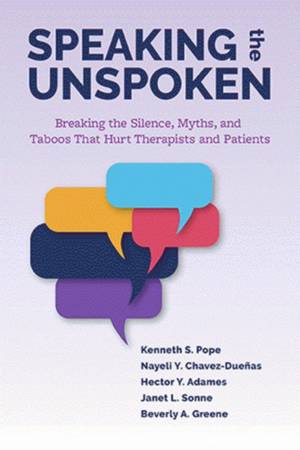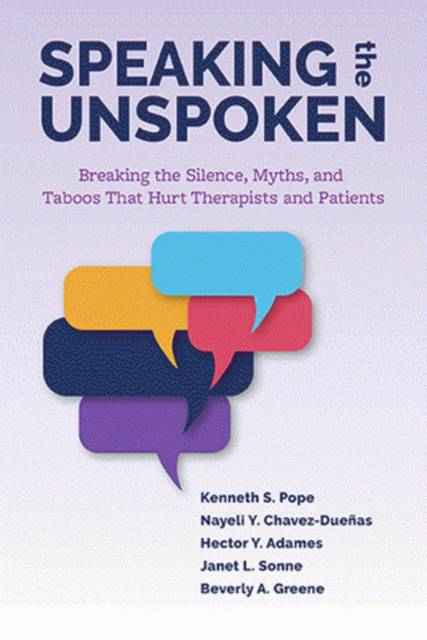
Je cadeautjes zeker op tijd in huis hebben voor de feestdagen? Kom langs in onze winkels en vind het perfecte geschenk!
- Afhalen na 1 uur in een winkel met voorraad
- Gratis thuislevering in België vanaf € 30
- Ruim aanbod met 7 miljoen producten
Je cadeautjes zeker op tijd in huis hebben voor de feestdagen? Kom langs in onze winkels en vind het perfecte geschenk!
- Afhalen na 1 uur in een winkel met voorraad
- Gratis thuislevering in België vanaf € 30
- Ruim aanbod met 7 miljoen producten
Zoeken
Speaking the Unspoken
Breaking the Silence, Myths, and Taboos That Hurt Therapists and Patients
Kenneth S Pope, Nayeli Y Chavez-Dueñas, Hector Y Adames, Janet L Sonne, Beverly A Greene
Paperback | Engels
€ 58,45
+ 116 punten
Omschrijving
This book shows how silence around taboo topics can undermine therapy goals, as well as the teaching, practice, and profession of psychotherapy more broadly. It gives readers the skills they need to recognize and overcome barriers to speaking up. The authors describe current and historical contexts that can make frank discussions of certain topics difficult, and present factors that play a role in self-silencing. Strategies including questions for reflection and group exercises can help readers build the courage to talk more openly, honestly, and directly in the therapy room and beyond. Chapters focus on a variety of topics that can be difficult to discuss openly including physical difference and disability, sexual orientation, sexual reactions to clients, therapist feelings of anger, oppression, white supremacy culture, religion, money and fees, and death and dying. Speaking the Unspoken seeks to create dialogue, by encouraging the reader to deepen their understanding of these underexamined topics and improve their ability to help clients and strengthen the profession.
Specificaties
Betrokkenen
- Auteur(s):
- Uitgeverij:
Inhoud
- Aantal bladzijden:
- 190
- Taal:
- Engels
Eigenschappen
- Productcode (EAN):
- 9781433841590
- Verschijningsdatum:
- 6/06/2023
- Uitvoering:
- Paperback
- Formaat:
- Trade paperback (VS)
- Afmetingen:
- 156 mm x 229 mm
- Gewicht:
- 290 g

Alleen bij Standaard Boekhandel
+ 116 punten op je klantenkaart van Standaard Boekhandel
Beoordelingen
We publiceren alleen reviews die voldoen aan de voorwaarden voor reviews. Bekijk onze voorwaarden voor reviews.









